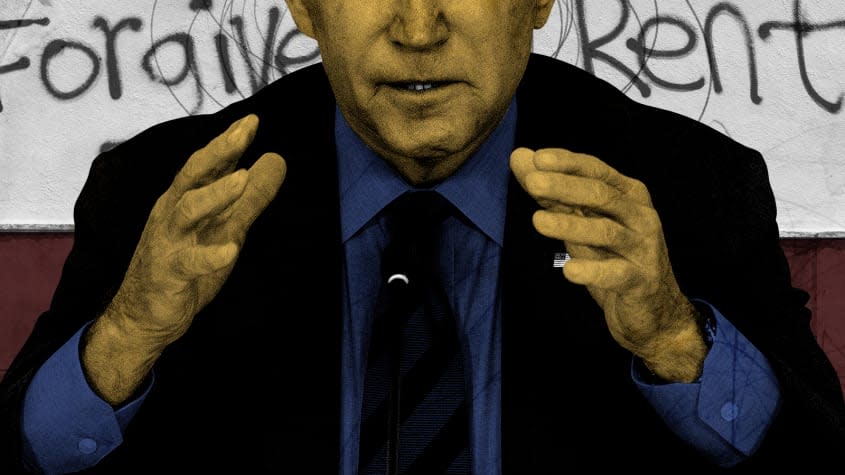Biden's lawless eviction moratorium will come back to haunt Democrats

President Biden's decision to revive the federal eviction moratorium is bad policy. It helps renters at the expense of millions of small-scale landlords, most of whom own a single rental property and cannot absorb thousands of dollars of unpaid rent. Read the stories of these landlords — who are essentially small business owners and, in many cases, working-class immigrants — and it becomes obvious #CancelRent is not the simple demand of justice for the downtrodden it is often made out to be. Bankrupting small landlords out of the rental game won't mean no rent; it will mean the only landlords left are big corporations newly freed of independent competition.
Biden's call is likely bad politicking, too, as my colleague Jim Antle has argued. His attempt to please all constituencies may end up disappointing them all instead.
But beyond policy and politics, the worst part of Biden's choice is the precedent it sets. Asked on Tuesday whether his plan would "pass Supreme Court muster," Biden all but admitted he is knowingly violating the law — very possibly the Constitution itself. But, he said, legal challenge will be slow enough that the policy goal can be briefly accomplished before the extension is struck down in court:
The bulk of the constitutional scholarship says that it's not likely to pass constitutional muster. […] I don't know. There are a few scholars who say it will and others who say it's not likely to. But, at a minimum, by the time it gets litigated, it will probably give some additional time while we're getting that $45 billion [previously allocated as back rent to pay to landlords banned from evicting] out to people who are, in fact, behind in the rent and don't have the money. [President Biden, via Whitehouse.gov]
Willfully breaking the law and relying on judicial delay to get away with it is an awful approach to governance. It is lawlessness. And though presidential lawbreaking is hardly new — I'd be utterly unsurprised to learn past presidents discussed this very strategy behind closed doors — Biden's blatant, public announcement of intent to thus exploit our court system seems to be an innovation.
I reached out to constitutional law expert Ilya Shapiro, legal scholar Walter Olson, and law professor Ilya Somin to see if that impression was correct. All three struggled to suggest a comparably brazen example from U.S. history.
Shapiro identified a similar spirit in President Richard Nixon's infamous claim that "when the president does it, that means that it is not illegal" and in President Andrew Jackson's possibly apocryphal threat to ignore a Supreme Court ruling because the justices could not enforce it. Olson told me former President Barack "Obama pushed through legally dubious interpretations on [the immigration policy] DACA and [the Affordable Care Act, commonly called] ObamaCare, but stalling for time wasn't exactly the rationale," nor was there this open acknowledgement of illicit action.
Somin said he thinks "this has been done a number of times in previous administrations, including under [former President Donald] Trump," but he isn't "aware of any president actually saying in so many words — as Biden just did — that this is what he's doing." Somin did think of one presidential legal saga with a chronological element: a World War II espionage case, ex parte Quirin, in which President Franklin Delano Roosevelt rushed the execution of German saboteurs, who had been convicted by a military tribunal, so the men were dead before the Supreme Court issued its full opinion on the tribunal's legitimacy.
For all that case's controversy, however, FDR at least had a brief, per curiam opinion from the court authorizing him to move forward. Here, Biden neither has — nor, apparently, expects — any such thing. He's racing away from judicial censure, not toward judicial approval.
The risk in this precedent should be obvious even to those who support the immediate policy outcome. You may believe Biden is morally justified here, that he was, as a CNN analysis put it, left with "no choice" but to "make drastic moves ... even if he's not sure they're legal." So what happens when the president is not thus constrained by circumstance yet uses this strategy anyway? What happens when there's a different president, maybe from a different party? Let us not imagine the Republicans will evince any principle here. Democrats will come to regret this (provided they manage to remember they started it).
As a candidate, Biden promised to take "aggressive action" to "maintain the rule of law, and to bring integrity back to our justice system." Instead he's hit upon a novel way to degrade the rule of law and make our justice system a joke. Future presidents will copy this exploitation if Biden pulls it off. A president can deport a lot of people, or build a lot of border wall, or drop a lot of bombs, or take down a lot of websites, or send a lot of weapons to a lot of dictators, or expedite a lot of federal executions "by the time it gets litigated."
Is that the standard of governance we want? Is the pace of a jurist's pen enough defense against rule by one man's fiat?
You may also like
Why Tom Brady's 'gentle' roast of Trump at Biden's White House was actually 'deeply vicious'
Arkansas governor admits he regrets signing mask mandate ban into law
Israeli data suggest infected, vaccinated individuals have low chance of spreading COVID-19

 Yahoo Movies
Yahoo Movies 
